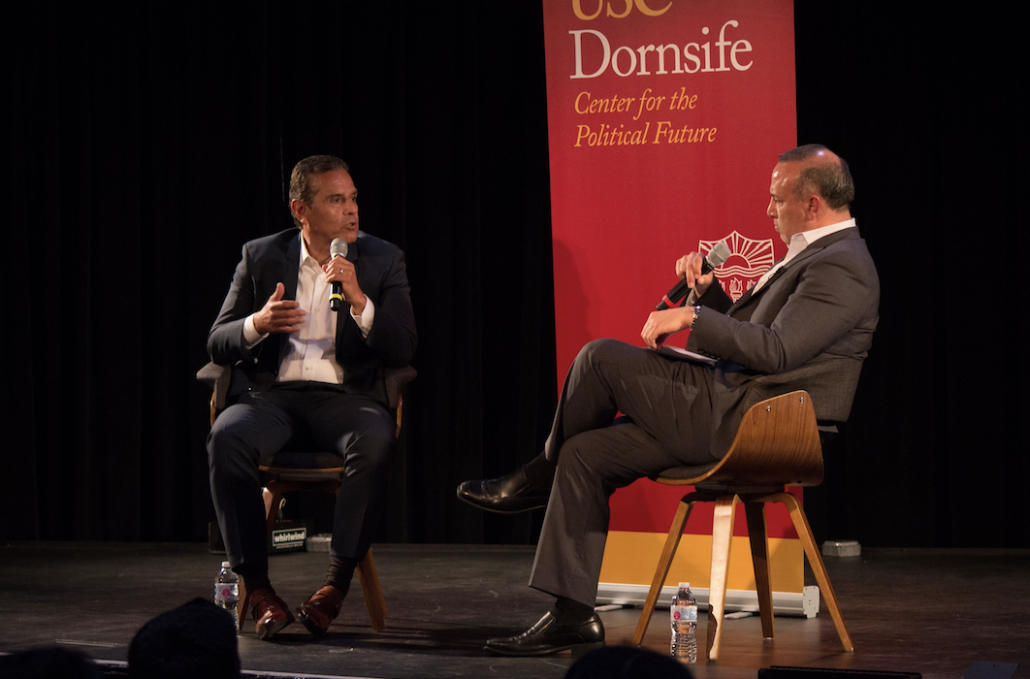Former LA mayor discusses race in politics

The Center for the Political Future hosted a conversation Tuesday with former Los Angeles Mayor Antonio Villaraigosa. Center fellow Mike Madrid and Villaraigosa discussed race in politics and the platforms of current presidential candidates.
The event was part of the Center’s “Political Conversations” series where prominent political commentators and politicians to speak about current political issues.
Madrid started the conversation by introducing some of Villaraigosa’s accomplishments.
“Villaraigosa started his career and professional life in public service as a community organizer,” Madrid said. “As [someone who has] marched for farm workers and social justice issues … working with the Los Angeles teaching union and served as the President of the Southern California Chapter of the American Civil Liberties Union … [his] fights have always been on behalf of working men and women, people of color and voices [that] have been marginalized.”
Villaraigosa, who served as mayor from 2005 to 2013, was the first Mexican American to serve in this position in over 130 years. As mayor, he focused on transportation, crime reduction, infrastructure, sustainability and education reform.
Villaraigosa said when he ran for California State Assembly in 1994, he was labeled as a progressive politician before the word became prominent in politics.
“I’ve heard it said that I was a progressive before the word became popular … [I was] championing issues like [banning] assault weapons in the ‘90s [and] the [broken] criminal justice system,” Villaraigosa said. “[It] disproportionately impacted blacks, Latinos and poor people.”
Villaraigosa said some of the policies he championed were not as popular then as they are now. He said from the beginning that he was against the death penalty and in support of immigration. He said he focused much of his career on creating more opportunities for the Latinx and African American communities.
Villaraigosa described himself as a politician who is not just a representative of the Latinx community, but a representative of the community as a whole. He said during his mayoral campaign he was especially frustrated with the media solely identifying him as a Latino.
“I was never a Latino Speaker [of the California Assembly], I was a Speaker for everyone,” Villaraigosa said. “In a city as diverse as LA, I needed to be a leader for everyone.”
Villaraigosa said questions regarding his Hispanic background had a positive effect on the Latinx community. He said he was often asked how he could get elected with only the Latinx vote. He combatted these stereotypes by reminding the community that his heritage did not only have Latino roots.
“I was born here, my mother was born here, my grandpa got here 100 years ago,” Villaraigosa said. “So why [did the media] keep describing me in that way?”
Villaraigosa, who recently lost his bid for the California governor’s seat, said it was “disconcerting” that the votes in 2018 were separated by race. Villaraigosa said the majority of white voters cast their ballot for Gov. Gavin Newsom, the majority of Asian voters for candidate John Chung and the Latinx and African American voters for Villaraigosa.
Not all audience members agreed with Villaraigosa’s view on voting by race. Ana Charco, a sophomore majoring in law, history and culture, said that it was natural for voters to vote for candidate they most identify with during elections.
“People see themselves in the candidates … I would vote for the individual that looks like myself,” Charco said. “Most of the voters have not familiarized [themselves] with the candidates and will vote with the familiarities of their last name.”
Villaraigosa discussed presidential candidate Beto O’Rourke and commented on his Spanish-speaking ability, saying that overall, he was not insulted by O’Rourke’s use of a Latin-sounding first name despite not being Hispanic.
“Good for [him] … he’s representing a community in the south of Texas, many of whom are Spanish-speaking, and [he] found it important enough, out of respect for that community, to learn Spanish,” Villaraigosa said.
To conclude the conversation, an audience member commented on Villaraigosa and Madrid’s opposing views on current issues, especially since both represent different political parties.
Madrid said that although he and Villaraigosa’s positions on political issues differ, they still care equally for their community.
“We share a lot of common beliefs about the poor or the need to help our fellow man, we just had different ways of approaching those solutions,” Madrid said. “What it comes down to is I never questioned where his heart was or what his goals were.”
India McTaggart, a junior majoring in philosophy and journalism, said she enjoyed seeing two prominent political figures overcome their differences to discuss political issues.
“I think it was a lovely, hopeful discussion between them,” McTaggart said. “[Villaraigosa’s] political views represent what we should be striving for in both parties: unity, equality, inclusion, democratic values.”

